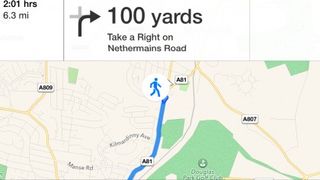Apple Maps: one year on
Does the latest Maps have what it takes to win you back?
iOS 7's Maps also get another new feature: if you allow it, it will use the Frequent Locations feature, which records your most commonly visited places, and correlate it with your Apple ID to work out where you live.
The data, which Apple promises will only be retained in anonymous form, will be used to improve Maps' accuracy. It's likely that iOS in the Car will have similar data collection.

Maps is increasingly integrated in OS X, too, with the incoming Mavericks using Maps for locations in Mail, Calendar and Contacts.
Mavericks gets a desktop version of the Maps app as well, and you'll be able to sync locations from your Mac to your iPhone or iPad and vice versa. Apple is hoping for a virtuous circle here: the more people use Maps, submit data and report problems, the more accurate Apple can make it.
Putting money where Maps is
Apple made two big mistakes with Maps: it launched too early, and it didn't give the project sufficient resources. It can't do much about the former but it's definitely learned its lesson with the latter: over the last year, Apple has been putting its money where its maps are.
It has hired multiple "Maps Ground Truth Managers", whose role is to improve Maps' accuracy. It bought HopStop, which specialised in public transport mapping and information, and Embark, which does much the same. It also bought indoor mapping company WifiSLAM and the crowdsourced data firm Locationary, whose business was based on ensuring businesses' entries in mapping services were accurate.

Apple has even developed a chip to make Maps better. The new M7 motion co-processor, introduced this month in the iPhone 5s, isn't just for fitness apps. Apple didn't mention it in the keynote but in its website blurb for the M7 it says: "M7 knows when you're walking, running, or even driving. For example, Maps switches from driving to walking turn-by-turn navigation if, say, you park and continue on foot."
Get daily insight, inspiration and deals in your inbox
Get the hottest deals available in your inbox plus news, reviews, opinion, analysis and more from the TechRadar team.
It knows if you're in a vehicle or if you're on foot, and it could easily tell Maps if you're driving at 100mph on a road Maps thinks is a lake. According to 9to5Mac.com, it might even help you find your car when you park it by remembering your location automatically.
The maps, then, are getting better - but Apple Maps' biggest challenge might be persuading people that that's the case.
Thanks to endless coverage and parodies such as Mad Magazine's superb fake New Yorker cover, an awful lot of people associate Apple's Maps with unreliability: if you type "Apple Maps is" into Google UK, the first three autocompletes are "is terrible", "issues" and "is rubbish". Apple can fix its data. Can it fix that?
Writer, broadcaster, musician and kitchen gadget obsessive Carrie Marshall (Twitter) has been writing about tech since 1998, contributing sage advice and odd opinions to all kinds of magazines and websites as well as writing more than a dozen books. Her memoir, Carrie Kills A Man, is on sale now. She is the singer in Glaswegian rock band HAVR.
Most Popular


